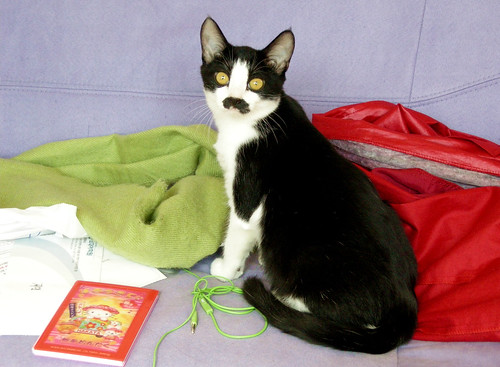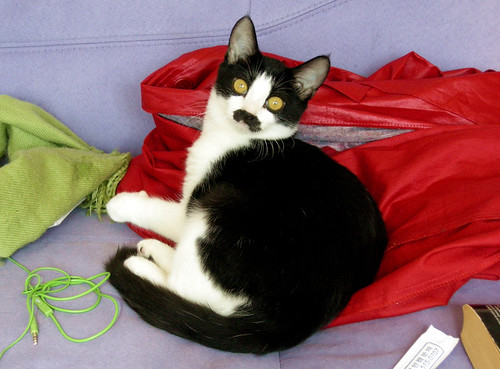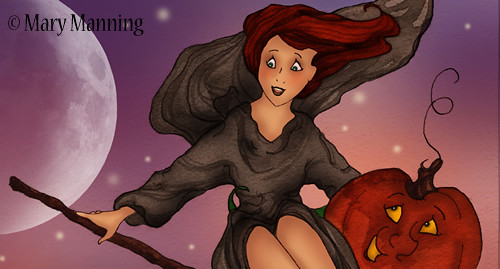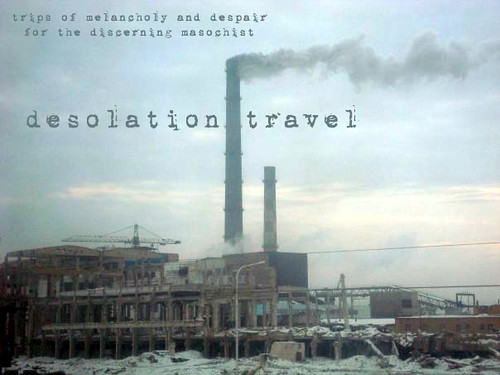CLICK HERE and enjoy :-)
Sunday, October 31, 2010
The continuing process of winning over a feral cat


Looking at these pictures, it's almost impossible to believe that this is the same dirty and terrified kitten that I rescued, kicking, screaming, and biting, from the mean streets of Daegu back in early September. For starters, Charlie is getting FAT. He (or she; I still haven't been able to check) eats a lot, and I am perfectly happy to spend my hard earned cash of an endless supply of Whiskas. Unfortunately, after nearly two months, I still can't pet him. He has, however, gotten much braver. No longer does he spend all day hiding out of sight under the bed or inside the couch. Nowadays, he likes to be in the same room with me (even following me to the bathroom), and will sit on the couch (in the above pics) or on my bed... keeping me company from about two feet away. Any attempts to pet him result in him scurrying off. What he loves more than anything is his toy - we go through about one of these a week - which he plays with constantly. I'm definitely hopeful that eventually I will have a snuggly, purring friend, although right now I'm content to have a furry friend staring at me from across the room.
ALSO: Anyone near Seoul interested in adopting a super-cute and super-friendly, super-tiny kitten? If so, check out this blog for more info!!
Saturday, October 30, 2010
Halloween in Korea

Friday we had our Halloween party at the school.
Thursday, October 21, 2010
More desolation!
UPDATED: Since I posted this, we've added a trip along the Pamir Highway and a phone-in appearance by my friend Joanna on a radio program about Siberia to the blog - so be sure to check it! Additionally, we now have SIX photo galleries up on desolationtravel.com!
Interested in hearing about the drunken, nine-fingered, Ukrainian plumber? Or a trip by rail from Beijing to Kyiv? How about a Christmas-day visit to the former shores of the decimated Aral Sea? Or a trip by motorcycle across the melting ice of the world's deepest lake? We've got it all over at the Desolation Travel Blog!!
Saturday, October 16, 2010
Dear Authors of ESL/EFL Textbooks:
I understand that you put a lot of effort into the books you write. I understand that the goals of an ESL/EFL textbook author are to make the book not only educational, but interesting, entertaining, and multi-cultural. However, I have some complaints.
1. Avoid names such as Juana, which do not follow English pronunciation rules. I understand that the inclusion of characters of different ethnicities is common in EFL/ESL texts, and I have no problem with this. However, when students – especially those at the lower levels – are struggling to master pronunciation of the English language (and this is especially difficult for those students whose native language utilizes a different alphabet), trying to explain why the textbook’s CD doesn’t say “jew-anna” is not only not useful, but counter-productive.
2. Avoid codes. Talk about useless filler. There is absolutely no practical benefit derived from struggling to explain what a code is and how we must decode it, even if the decoded message is in English.
3. Think about the language level of the students when writing instructions for them to follow. If students are learning to say things along the lines of “My name is Jane and I like cats,” they will not understand the instructions “Select the hidden words, then draw the missing animal.”
4. Don’t overdo accents. Having people who speak English in a variety of accents can be useful, especially considering that most English speakers do not speak like either Tom Brokaw or the British upper classes. It is good for students to have the opportunity to listen to English spoken in a variety of ways. However, there are some problems with overdoing accents on ESL/EFL textbook CDs. Many upper-level students join ESL/EFL classes with the goal of reducing their “foreign” accent when speaking English. Additionally, multiple accents can be confusing and extremely difficult for low-level students. Also: if you’re going to include ethnic accents on your text’s CD, please use actual people who speak with those accents. There is nothing more horrible than listening to obviously fake foreign accents – and there is nothing useful in that, either.
5. Songs should be used for their words, not their music. Songs can make excellent teaching tools, and I love bringing songs into the classroom. However, songs that are useful are those which are easy to understand, slow enough to be sung, and which pertain in some way to the lesson at hand (ie, utilizing the grammar or vocabulary of the lesson). Long musical introductions and interludes are not useful and are a waste of time. Additionally, songs that are too fast or are too strangely/thickly accented for a native English speaker to clearly understand have no place in an ESL/EFL text.
6. Beware of idioms. I actually have an entire post on idioms in the ESL/EFL classroom that will go online soon, so I won’t write much here. The short version: while it is important that advanced-level students understand idioms (so that when a foreign drama student is told to break a leg, he won’t be confused or offended, etc) this is a very difficult aspect of a language for non-native speakers to master and sound natural. Don’t waste too much time on idioms, especially at lower levels. Conversely, if you’re not teaching idioms, don’t randomly throw one into the text.
7. Hire a competent native English speaker to edit your textbook. The best textbooks I have used have been published in either the US or the UK, where this is not an issue. However, many countries (yes, South Korea, I’m looking at you) offer numerous ESL/EFL texts which are written and published locally. I don’t care how fluent you are (or think you are), get a native speaker to proofread. It is easy to tell which textbooks were written and edited entirely by a non-native speaking staff.
1. Avoid names such as Juana, which do not follow English pronunciation rules. I understand that the inclusion of characters of different ethnicities is common in EFL/ESL texts, and I have no problem with this. However, when students – especially those at the lower levels – are struggling to master pronunciation of the English language (and this is especially difficult for those students whose native language utilizes a different alphabet), trying to explain why the textbook’s CD doesn’t say “jew-anna” is not only not useful, but counter-productive.
2. Avoid codes. Talk about useless filler. There is absolutely no practical benefit derived from struggling to explain what a code is and how we must decode it, even if the decoded message is in English.
3. Think about the language level of the students when writing instructions for them to follow. If students are learning to say things along the lines of “My name is Jane and I like cats,” they will not understand the instructions “Select the hidden words, then draw the missing animal.”
4. Don’t overdo accents. Having people who speak English in a variety of accents can be useful, especially considering that most English speakers do not speak like either Tom Brokaw or the British upper classes. It is good for students to have the opportunity to listen to English spoken in a variety of ways. However, there are some problems with overdoing accents on ESL/EFL textbook CDs. Many upper-level students join ESL/EFL classes with the goal of reducing their “foreign” accent when speaking English. Additionally, multiple accents can be confusing and extremely difficult for low-level students. Also: if you’re going to include ethnic accents on your text’s CD, please use actual people who speak with those accents. There is nothing more horrible than listening to obviously fake foreign accents – and there is nothing useful in that, either.
5. Songs should be used for their words, not their music. Songs can make excellent teaching tools, and I love bringing songs into the classroom. However, songs that are useful are those which are easy to understand, slow enough to be sung, and which pertain in some way to the lesson at hand (ie, utilizing the grammar or vocabulary of the lesson). Long musical introductions and interludes are not useful and are a waste of time. Additionally, songs that are too fast or are too strangely/thickly accented for a native English speaker to clearly understand have no place in an ESL/EFL text.
6. Beware of idioms. I actually have an entire post on idioms in the ESL/EFL classroom that will go online soon, so I won’t write much here. The short version: while it is important that advanced-level students understand idioms (so that when a foreign drama student is told to break a leg, he won’t be confused or offended, etc) this is a very difficult aspect of a language for non-native speakers to master and sound natural. Don’t waste too much time on idioms, especially at lower levels. Conversely, if you’re not teaching idioms, don’t randomly throw one into the text.
7. Hire a competent native English speaker to edit your textbook. The best textbooks I have used have been published in either the US or the UK, where this is not an issue. However, many countries (yes, South Korea, I’m looking at you) offer numerous ESL/EFL texts which are written and published locally. I don’t care how fluent you are (or think you are), get a native speaker to proofread. It is easy to tell which textbooks were written and edited entirely by a non-native speaking staff.
Friday, October 15, 2010
Super Awesome Links!
The Desolation Travel website is still under construction, but at least we now have one page of content, and we already have a couple of blog posts up at our blog.
 Clicking here (or on the image above) will take you to an absolutely stunning collection of photographs taken by Ben Rich in the Chernobyl Dead Zone area of Belarus.
Clicking here (or on the image above) will take you to an absolutely stunning collection of photographs taken by Ben Rich in the Chernobyl Dead Zone area of Belarus.
Please check out our blog: http://desolationtravel.blogspot.com
to read the story of Ben's trip to the Dead Zone
to read the story of Ben's trip to the Dead Zone
Tuesday, October 12, 2010
Just in time for Columbus Day
 Just in time for Columbus Day (which I say with irony), I have finished reading Eye of the Raven, the second in Eliot Pattison's Colonial America mystery series. I utterly adore Eliot Pattison - his prose is beautiful, his plots are intricate, and his insight is incredible. Eye of the Raven does not disappoint. Like his Inspector Shan series of mysteries set in Tibet, his Colonial America mysteries illuminate the impact of a conquering empire on a traditional culture. While reading the Tibetan series, it is easy to cast aspersions on the modern-day Chinese for their continued attempts at the destruction of the Tibetan way of life... Yet this glimpse into pre-Revolutionary War relations between European settlers and indiginous Americans shows our ancestors to be little better than the modern-day Chinese. Makes me proud to be a quarter Scottish (the European protagonist is a Scot), and relieved that my ancestors didn't make it to the "new world" until the 20th century. I recommend reading all books by Pattison - if you're interested in the Tibetan series, you should start with The Skull Mantra, and it you're interested in his colonial American series, you should start with The Bone Rattler. [Also, Happy Birthday, Melissa!!]
Just in time for Columbus Day (which I say with irony), I have finished reading Eye of the Raven, the second in Eliot Pattison's Colonial America mystery series. I utterly adore Eliot Pattison - his prose is beautiful, his plots are intricate, and his insight is incredible. Eye of the Raven does not disappoint. Like his Inspector Shan series of mysteries set in Tibet, his Colonial America mysteries illuminate the impact of a conquering empire on a traditional culture. While reading the Tibetan series, it is easy to cast aspersions on the modern-day Chinese for their continued attempts at the destruction of the Tibetan way of life... Yet this glimpse into pre-Revolutionary War relations between European settlers and indiginous Americans shows our ancestors to be little better than the modern-day Chinese. Makes me proud to be a quarter Scottish (the European protagonist is a Scot), and relieved that my ancestors didn't make it to the "new world" until the 20th century. I recommend reading all books by Pattison - if you're interested in the Tibetan series, you should start with The Skull Mantra, and it you're interested in his colonial American series, you should start with The Bone Rattler. [Also, Happy Birthday, Melissa!!]Sunday, October 10, 2010
Dubious Jack the Pumpkin King - For Sale Online Now!

My friend Chris's book, Dubious Jack the Pumpkin King, is now being sold online! Just click here or on the picture above to purchase. The cost is $12.99, which includes the cost of shipping if you're inside the USA. (Outside the US? Contact Chris directly at christopheresing@yahoo.com for a shipping quote.) If you'd like the book signed or dedicated to anyone, please select "Add special instructions to merchant" while you're making your payment, and include that information there. Order now so you can get your copy in time for Halloween! :-)
Friday, October 08, 2010
Because what I needed was another web project...

http://www.desolationtravel.com
(Don't get too excited... there's no content yet.)
Wednesday, October 06, 2010
The Reluctant Communist
 I just finished reading The Reluctant Communist: My Desertion, Court-Martial, and Forty-year Imprisonment in North Korea by Charles Robert Jenkins (with the help of Jim Frederick), and I have *very* mixed feelings about it. I read this book from beginning to end rather quickly, and I found it absolutely fascinating… if at times rather grating.
I just finished reading The Reluctant Communist: My Desertion, Court-Martial, and Forty-year Imprisonment in North Korea by Charles Robert Jenkins (with the help of Jim Frederick), and I have *very* mixed feelings about it. I read this book from beginning to end rather quickly, and I found it absolutely fascinating… if at times rather grating.This book, as you might be able to glean from the title, is about a former US Army soldier Sergeant Charles Robert Jenkins who, while stationed at the DMZ in 1965 decided to go AWOL and cross the border into North Korea. He didn’t choose to do this out of some ideological affinity for North Korea; he did it because he had some damn fool idea that the North Koreans would send him via Russia to the US – and he would thereby manage to get sent home and, as such, avoid dangerous assignments along the DMZ and a possible transfer to Vietnam. And, oh yeah – he was drunk at the time, so no doubt this seemed like a logical decision.
Jenkins writes about his “forty-year imprisonment” as though he suffered in the gulags alongside average North Koreans… whereas in truth, while his existence was far from Western upper-class comfort, it was princely by North Korean standards. All that being said, I still found the book fascinating. There are so few stories out there about day-to-day life in North Korea – and none such by any other Americans – that this book provides a wealth of insights unavailable anywhere else. I won’t go into the details; if this is something that interests you, read the book.
I will, however, point out a couple of rather mundane things that caught my eye:
The product-purchasing system that existed in the Former Soviet Union – and which still can be found in many stores (although decreasing in number) across the FSU – was apparently common in North Korea as well. This is how the “system” works: You tell Storekeeper A what you want to buy. S/he gives you a ticket, which you take to Storekeeper B. You pay Storekeeper B and are given a receipt. You take this receipt back to Storekeeper A, and are only then given the item. I hadn’t realized that this “system” was found in any countries other than the FSU, although it makes an odd kind of sense for it to exist in a Communist country. After all, everyone *must* be employed, so the more jobs available (even if they are needless), the better.
One thing which Jenkins mentioned as being “typically North Korean,” but which jumped out at me as being “typically Korean” came from an instance in which one of his friends (another American defector, Jerry Wayne Parrish) was dying of kidney failure. Parrish had been hospitalized numerous times for minor kidney troubles, and simply assumed this was another such minor event – the hospital released him, allowing him to continue believing this, but told his friends and family the truth: he was dying, and they thought it was best for him to remain unaware of this fact. I have heard numerous times here in South Korea that doctors will never (or rarely, depending on who you ask about this) tell a patient that s/he is terminal so as not to worry him/her. I find it rather reassuring that there are still cultural oddities which span the peninsula.
Tuesday, October 05, 2010
The process of winning over a feral kitty
The process of winning over a feral kitty can be a long and rather frustrating one. I would love to have a snuggly, purring kitten cuddling next to me, but for now I must content myself with one who watches me from across the room or from under the couch. I still don't even know if Charlie is a boy or a girl, as I haven't been able to catch him/her to check. Nonetheless, our relationship is definitely improving. S/he no longer immediately runs and hides upon seeing me, and we have even begun playing together. I have a mouse-on-a-string toy which s/he LOVES. If I sit on the bed a wield the toy over the edge, s/he will play for hours. I've yet to trick him/her into chasing the toy onto the bed while I'm sitting there, though! Anyway, below are two recent photos of Charlie, and one video of him/her and the toy. Enjoy!


(Sadly, he only appears twice in this video, but you'll get the idea)
I do love me some Carl

1994-1995 was an… interesting period in my life. It was my Sophomore year of high school. It was the time when I developed my first serious crush, suffered my first bout of depression, and was consumed with insecurities. Yet oddly enough, it was also a time of self-confidence, when I fully embraced weirdness, and when I felt as though I could achieve anything. And it was when I fell in love with Carl Sagan [wikipedia].
During my Sophomore year of high school, I devoured everything that he had written – and my favorite of his works was Pale Blue Dot. I read that book numerous times, and wove his words into the fabric of cosmos-related fantasies which pervaded my life at that time. At that time I decided that what I wanted out of life was to become an astronomer… a dream which I held until my first semester at Sewanee, when I discovered that Physics and I were not destined for friendship. (Honestly, it was an incredibly depressing moment when I came to the realization that I would never become an astronomer.)
Nonetheless, my collection of the works of Carl Sagan remained one of my prized possessions until 2009, when in one of the many terrible decisions I made that year, I sold them on Ebay. (Please keep in mind that I was all but unemployed, working 6-10 hours a week at minimum wage, and I had no money but what I could borrow from my mother. This doesn’t so much excuse the act, as explain the motivation behind it.) I almost cried when I packaged the books up and sent them off… and I really did cry rather hysterically when I received a message from their buyer stating that they had been seriously damaged in transport, and he wanted a refund.
Carl Sagan died in 1996… by last Friday he appeared on NPR’s Science Friday, as they were celebrating their 20th anniversary by playing some of their favorite past interviews. I listened to the podcast on my way to work this morning. It brought tears to my eyes, and I’ve been in a funky weird mood ever since. Anyway, you can listen to Carl yourself by clicking here.
Also, would Pale Blue Dot be Голубая Точка or Голубой Пункт? And given the slang connotations of голубой, I wonder how this notion plays in Russia? Oh-бляд-i-oh- бляд-a, life goes on… lalalala life goes on :-)
During my Sophomore year of high school, I devoured everything that he had written – and my favorite of his works was Pale Blue Dot. I read that book numerous times, and wove his words into the fabric of cosmos-related fantasies which pervaded my life at that time. At that time I decided that what I wanted out of life was to become an astronomer… a dream which I held until my first semester at Sewanee, when I discovered that Physics and I were not destined for friendship. (Honestly, it was an incredibly depressing moment when I came to the realization that I would never become an astronomer.)
Nonetheless, my collection of the works of Carl Sagan remained one of my prized possessions until 2009, when in one of the many terrible decisions I made that year, I sold them on Ebay. (Please keep in mind that I was all but unemployed, working 6-10 hours a week at minimum wage, and I had no money but what I could borrow from my mother. This doesn’t so much excuse the act, as explain the motivation behind it.) I almost cried when I packaged the books up and sent them off… and I really did cry rather hysterically when I received a message from their buyer stating that they had been seriously damaged in transport, and he wanted a refund.
Carl Sagan died in 1996… by last Friday he appeared on NPR’s Science Friday, as they were celebrating their 20th anniversary by playing some of their favorite past interviews. I listened to the podcast on my way to work this morning. It brought tears to my eyes, and I’ve been in a funky weird mood ever since. Anyway, you can listen to Carl yourself by clicking here.
Also, would Pale Blue Dot be Голубая Точка or Голубой Пункт? And given the slang connotations of голубой, I wonder how this notion plays in Russia? Oh-бляд-i-oh- бляд-a, life goes on… lalalala life goes on :-)
Monday, October 04, 2010
I know too much, and my horses are swift: a nice rambling post about vampires
As it’s Halloween season once again, I think it’s an appropriate time for a discussion revolving around a book I just finished re-reading for the umpteenth time: Dracula. My dad read this out loud to me as a kid, and when I was in the 6th grade, I remember reading it over and over until the cover fell off and pages fell out. It’s rare indeed that you can find a book that you love as much as a 12 year old as you do as an adult, yet for me Dracula is definitely one of the few.
Dracula was one of the many English language books left in the apartment that my cousin George inherited upon his arrival in Korea, and as he wasn’t interested in it (!!) I snapped it up.
Of course, you view any book, however beloved, differently when reading it as an adult, and I have to admit that I’ve been analyzing a tad too much. Let’s see what you think about my train of thought:
In Bram Stoker’s Dracula, the Count and other vampires are held off by crucifixes and communion wafers. Would talismans of other religions have had the same effect? Or had Count Dracula set off east from Transylvania instead of west, would his depredations have been allowed to continue unabated – at least until the arrival of some adequately equipped Catholic missionaries?
Moving on. Are any of you True Blood watchers? I only started watching the show shortly after returning to Korea – but as they show two episodes every Friday night, I’m already about six episodes into Season 2. (Don’t give me any spoilers!!) I recently watched the episode in which the following interaction takes place between Jason Stackhouse and other members of the Fellowship of the Sun:
Jason: I don't know who Lazarus was but he sure as hell wasn't the first vampire. Everybody knows it was Dracula.
Luke: It's in the Bible, moron. Jesus brought Lazarus back from the dead.
Jason: So Jesus made the first vampire? Maybe Jesus was the first vampire. I mean he rose from the dead too, and he told people "Hey y'all drink my blood. It'll give you special powers."
Luke: Jesus never said that.
And this segue, via the reference to communion, brings me back to Catholicism. I don’t know much of anything about Bram Stoker, other than that he was born in Ireland and that he wrote Dracula. I don’t know if he was a Catholic, Protestant, or an Atheist – although I would infer Catholic from his writings.
Now, England (unlike Ireland) is not a Catholic country, nor was it at the time Dracula was written – and surely I need not remind you of the long history of conflicts between the Catholic Irish and the Protestant English – but I do wonder if there might have been some evermore subtler message from Irish Bram Stoker to the general literate British public. After all, only those utilizing Roman Catholic talismans are able to triumph in the battle against evil.
There is only the briefest of hesitations with regard to the use of non-Anglican “idols” near the tale’s beginning:
She then rose and dried her eyes, and taking a crucifix from her neck offered it to me. I did not know what to do, for, as an English Churchman, I have been taught to regard such things as in some measure idolatrous, and yet it seemed so ungracious to refuse an old lady meaning so well and in such a state of mind. She saw, I suppose, the doubt in my face, for she put the rosary around my neck, and said, “For your mother’s sake,” and went out of the room. I am writing up this part of the diary while I am waiting for the coach, which is, of course, late; and the crucifix is still round my neck.
Following this tiny episode of doubt regarding non-Anglican “idols” (occurring on page 5 of the book, no less!) all the protagonists cling tightly to their crucifixes…
Food for thought.
I shall leave you with two humorous videos, from Sesame Street of all places – although if you’re not a True Blood fan, you probably won’t understand the first one. Enjoy!
Dracula was one of the many English language books left in the apartment that my cousin George inherited upon his arrival in Korea, and as he wasn’t interested in it (!!) I snapped it up.
Of course, you view any book, however beloved, differently when reading it as an adult, and I have to admit that I’ve been analyzing a tad too much. Let’s see what you think about my train of thought:
In Bram Stoker’s Dracula, the Count and other vampires are held off by crucifixes and communion wafers. Would talismans of other religions have had the same effect? Or had Count Dracula set off east from Transylvania instead of west, would his depredations have been allowed to continue unabated – at least until the arrival of some adequately equipped Catholic missionaries?
Moving on. Are any of you True Blood watchers? I only started watching the show shortly after returning to Korea – but as they show two episodes every Friday night, I’m already about six episodes into Season 2. (Don’t give me any spoilers!!) I recently watched the episode in which the following interaction takes place between Jason Stackhouse and other members of the Fellowship of the Sun:
Jason: I don't know who Lazarus was but he sure as hell wasn't the first vampire. Everybody knows it was Dracula.
Luke: It's in the Bible, moron. Jesus brought Lazarus back from the dead.
Jason: So Jesus made the first vampire? Maybe Jesus was the first vampire. I mean he rose from the dead too, and he told people "Hey y'all drink my blood. It'll give you special powers."
Luke: Jesus never said that.
And this segue, via the reference to communion, brings me back to Catholicism. I don’t know much of anything about Bram Stoker, other than that he was born in Ireland and that he wrote Dracula. I don’t know if he was a Catholic, Protestant, or an Atheist – although I would infer Catholic from his writings.
Now, England (unlike Ireland) is not a Catholic country, nor was it at the time Dracula was written – and surely I need not remind you of the long history of conflicts between the Catholic Irish and the Protestant English – but I do wonder if there might have been some evermore subtler message from Irish Bram Stoker to the general literate British public. After all, only those utilizing Roman Catholic talismans are able to triumph in the battle against evil.
There is only the briefest of hesitations with regard to the use of non-Anglican “idols” near the tale’s beginning:
She then rose and dried her eyes, and taking a crucifix from her neck offered it to me. I did not know what to do, for, as an English Churchman, I have been taught to regard such things as in some measure idolatrous, and yet it seemed so ungracious to refuse an old lady meaning so well and in such a state of mind. She saw, I suppose, the doubt in my face, for she put the rosary around my neck, and said, “For your mother’s sake,” and went out of the room. I am writing up this part of the diary while I am waiting for the coach, which is, of course, late; and the crucifix is still round my neck.
Following this tiny episode of doubt regarding non-Anglican “idols” (occurring on page 5 of the book, no less!) all the protagonists cling tightly to their crucifixes…
Food for thought.
I shall leave you with two humorous videos, from Sesame Street of all places – although if you’re not a True Blood fan, you probably won’t understand the first one. Enjoy!
Friday, October 01, 2010
Subscribe to:
Comments (Atom)

